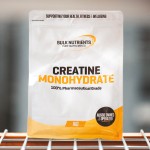Why women shouldn't fear creatine

What does creatine do?
To better understand creatine we need to look a little closer at the muscle.
In order for a muscle to contract, the cellular fuel molecule adenosine triphosphate (ATP) must break off a phosphate group, leaving behind adenosine diphosphate (ADP). Your body can’t use ADP. Luckily, the ADP borrows a phosphate molecule from your body’s store of creatine phosphate (PCr) to form more ATP.
Supplementing with creatine allows for more creatine phosphate to be available to replenish ATP stores. When your body can replenish energy more easily like this, you can train at higher intensities and with higher volume without fatiguing as quickly (Branch, 2003).
Studies have shown that both untrained and resistance-trained women can significantly increase both upper-body and lower-body strength when supplementing with creatine. Additionally, a 2003 review study found that women have greater relative improvements in strength compared with men: 14.8 percent versus 5.5 percent (Brenner, Walberg Rankin and Sebolt, 2000).
Creatine has also been shown to benefit athletes outside of the weight room. It improved sprint and agility performance in elite soccer athletes preparing for the Olympics and decreased recovery time for cyclists (Cox, Mujika, Tumilty and Burke, 2002).
So, how much should we be taking? Let’s discuss dosage and loading.

The loading myth
Ever heard of creatine loading? Well, there’s a theory out there that creatine needs to be ‘loaded’ in order to be effective. This loading theory has lifters consuming 20 grams of creatine per day for 5-7 day.
Find out all about weight training for women in our detailed guide.
Although there’s nothing wrong with loading, it can cause water retention and in the long term, isn’t more effective than taking a regular dose of creatine each day. However, for those bulking, loading is a great option as water retention isn’t an issue and the creatine load can promote fast gains.
A low-dose protocol (3-5 grams daily), is highly effective for all kinds of athletes wanting to increase strength, power and endurance and it’s highly unlikely you’ll see any change in your weight or any unpleasant side effects.

References:
- Branch, J., 2003. Effect of Creatine Supplementation on Body Composition and Performance: A Meta-analysis. International Journal of Sport Nutrition and Exercise Metabolism. [online] 13(2), pp.198-226. Available at: Effect of Creatine Supplementation on Body Composition and Performance: A Meta-analysis. International Journal of Sport Nutrition and Exercise Metabolism.
- Brenner, M., Walberg Rankin, J. And Sebolt, D., 2000. The Effect of Creatine Supplementation During Resistance Training in Women. The Journal of Strength and Conditioning Research. [online] 14(2), p.207. Available at: The Effect of Creatine Supplementation During Resistance Training in Women. The Journal of Strength and Conditioning Research.
- Cox, G., Mujika, I., Tumilty, D. and Burke, L., 2002. Acute Creatine Supplementation and Performance during a Field Test Simulating Match Play in Elite Female Soccer Players. International Journal of Sport Nutrition and Exercise Metabolism. [online] 12(1), pp.33-46. Available at: Acute Creatine Supplementation and Performance during a Field Test Simulating Match Play in Elite Female Soccer Players. International Journal of Sport Nutrition and Exercise Metabolism.
Related Blogs

How Much Muscle Can Women Gain Naturally?
Posted by Dayne Hudson
Estimated reading time: 4 minutes

7 Tips for Women Who Lift
Posted by Ellie Hearn
Estimated reading time: 6 minutes

Weight Training for Women
Posted by Ellie Hearn
Estimated reading time: 10 minutes
































